Dmitry Osin
EBES: Easy Benchmarking for Event Sequences
Oct 04, 2024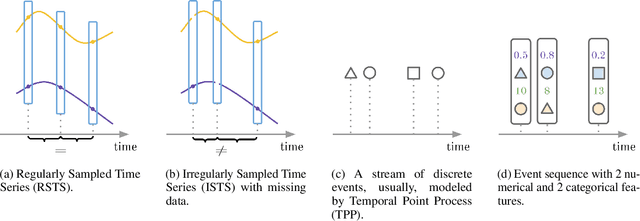
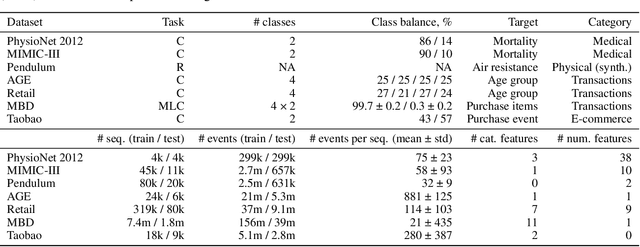


Abstract:Event sequences, characterized by irregular sampling intervals and a mix of categorical and numerical features, are common data structures in various real-world domains such as healthcare, finance, and user interaction logs. Despite advances in temporal data modeling techniques, there is no standardized benchmarks for evaluating their performance on event sequences. This complicates result comparison across different papers due to varying evaluation protocols, potentially misleading progress in this field. We introduce EBES, a comprehensive benchmarking tool with standardized evaluation scenarios and protocols, focusing on regression and classification problems with sequence-level targets. Our library simplifies benchmarking, dataset addition, and method integration through a unified interface. It includes a novel synthetic dataset and provides preprocessed real-world datasets, including the largest publicly available banking dataset. Our results provide an in-depth analysis of datasets, identifying some as unsuitable for model comparison. We investigate the importance of modeling temporal and sequential components, as well as the robustness and scaling properties of the models. These findings highlight potential directions for future research. Our benchmark aim is to facilitate reproducible research, expediting progress and increasing real-world impacts.
Self-Supervised Learning in Event Sequences: A Comparative Study and Hybrid Approach of Generative Modeling and Contrastive Learning
Jan 30, 2024



Abstract:This study investigates self-supervised learning techniques to obtain representations of Event Sequences. It is a key modality in various applications, including but not limited to banking, e-commerce, and healthcare. We perform a comprehensive study of generative and contrastive approaches in self-supervised learning, applying them both independently. We find that there is no single supreme method. Consequently, we explore the potential benefits of combining these approaches. To achieve this goal, we introduce a novel method that aligns generative and contrastive embeddings as distinct modalities, drawing inspiration from contemporary multimodal research. Generative and contrastive approaches are often treated as mutually exclusive, leaving a gap for their combined exploration. Our results demonstrate that this aligned model performs at least on par with, and mostly surpasses, existing methods and is more universal across a variety of tasks. Furthermore, we demonstrate that self-supervised methods consistently outperform the supervised approach on our datasets.
SeqNAS: Neural Architecture Search for Event Sequence Classification
Jan 06, 2024Abstract:Neural Architecture Search (NAS) methods are widely used in various industries to obtain high quality taskspecific solutions with minimal human intervention. Event Sequences find widespread use in various industrial applications including churn prediction customer segmentation fraud detection and fault diagnosis among others. Such data consist of categorical and real-valued components with irregular timestamps. Despite the usefulness of NAS methods previous approaches only have been applied to other domains images texts or time series. Our work addresses this limitation by introducing a novel NAS algorithm SeqNAS specifically designed for event sequence classification. We develop a simple yet expressive search space that leverages commonly used building blocks for event sequence classification including multihead self attention convolutions and recurrent cells. To perform the search we adopt sequential Bayesian Optimization and utilize previously trained models as an ensemble of teachers to augment knowledge distillation. As a result of our work we demonstrate that our method surpasses state of the art NAS methods and popular architectures suitable for sequence classification and holds great potential for various industrial applications.
QuantNAS for super resolution: searching for efficient quantization-friendly architectures against quantization noise
Aug 31, 2022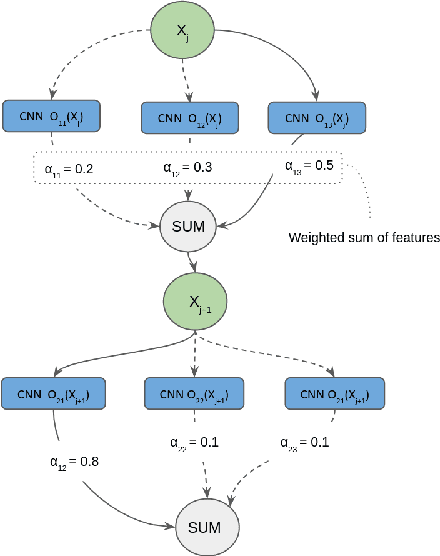
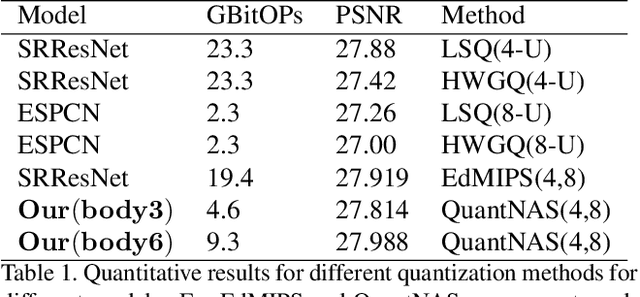
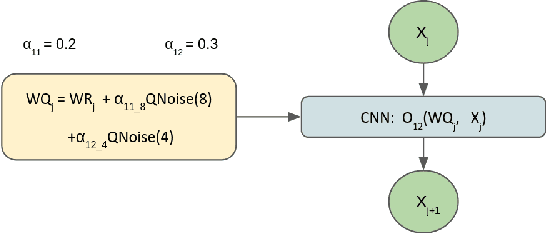

Abstract:There is a constant need for high-performing and computationally efficient neural network models for image super-resolution (SR) often used on low-capacity devices. One way to obtain such models is to compress existing architectures, e.g. quantization. Another option is a neural architecture search (NAS) that discovers new efficient solutions. We propose a novel quantization-aware NAS procedure for a specifically designed SR search space. Our approach performs NAS to find quantization-friendly SR models. The search relies on adding quantization noise to parameters and activations instead of quantizing parameters directly. Our QuantNAS finds architectures with better PSNR/BitOps trade-off than uniform or mixed precision quantization of fixed architectures. Additionally, our search against noise procedure is up to 30% faster than directly quantizing weights.
 Add to Chrome
Add to Chrome Add to Firefox
Add to Firefox Add to Edge
Add to Edge